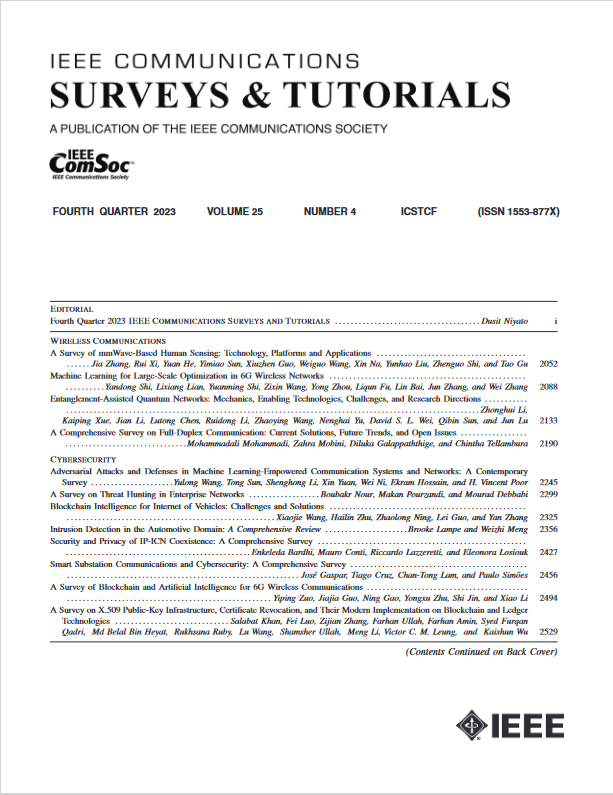On the Road to 6G: Visions, Requirements, Key Technologies, and Testbeds
IF 34.4
1区 计算机科学
Q1 COMPUTER SCIENCE, INFORMATION SYSTEMS
引用次数: 109
Abstract
Fifth generation (5G) mobile communication systems have entered the stage of commercial deployment, providing users with new services, improved user experiences as well as a host of novel opportunities to various industries. However, 5G still faces many challenges. To address these challenges, international industrial, academic, and standards organizations have commenced research on sixth generation (6G) wireless communication systems. A series of white papers and survey papers have been published, which aim to define 6G in terms of requirements, application scenarios, key technologies, etc. Although ITU-R has been working on the 6G vision and it is expected to reach a consensus on what 6G will be by mid-2023, the related global discussions are still wide open and the existing literature has identified numerous open issues. This paper first provides a comprehensive portrayal of the 6G vision, technical requirements, and application scenarios, covering the current common understanding of 6G. Then, a critical appraisal of the 6G network architecture and key technologies is presented. Furthermore, existing testbeds and advanced 6G verification platforms are detailed for the first time. In addition, future research directions and open challenges are identified to stimulate the on-going global debate. Finally, lessons learned to date concerning 6G networks are discussed.在通往6G的道路上:愿景、需求、关键技术和测试平台
第五代(5G)移动通信系统已进入商业部署阶段,为用户提供了新的服务,改善了用户体验,并为各个行业提供了一系列新的机会。然而,5G仍面临许多挑战。为了应对这些挑战,国际工业、学术和标准组织已经开始研究第六代(6G)无线通信系统。已经发表了一系列白皮书和调查论文,旨在从需求、应用场景、关键技术等方面定义6G。尽管ITU-R一直在致力于6G愿景,预计到2023年年中将对6G达成共识,但相关的全球讨论仍然是开放的,现有文献已经确定了许多悬而未决的问题。本文首先全面描述了6G的愿景、技术要求和应用场景,涵盖了当前对6G的普遍理解。然后,对6G网络体系结构和关键技术进行了评价。此外,还首次详细介绍了现有的试验台和先进的6G验证平台。此外,还确定了未来的研究方向和悬而未决的挑战,以激发正在进行的全球辩论。最后,讨论了迄今为止有关6G网络的经验教训。
本文章由计算机程序翻译,如有差异,请以英文原文为准。
求助全文
约1分钟内获得全文
求助全文
来源期刊

IEEE Communications Surveys and Tutorials
COMPUTER SCIENCE, INFORMATION SYSTEMS-TELECOMMUNICATIONS
CiteScore
80.20
自引率
2.50%
发文量
84
审稿时长
6 months
期刊介绍:
IEEE Communications Surveys & Tutorials is an online journal published by the IEEE Communications Society for tutorials and surveys covering all aspects of the communications field. Telecommunications technology is progressing at a rapid pace, and the IEEE Communications Society is committed to providing researchers and other professionals the information and tools to stay abreast. IEEE Communications Surveys and Tutorials focuses on integrating and adding understanding to the existing literature on communications, putting results in context. Whether searching for in-depth information about a familiar area or an introduction into a new area, IEEE Communications Surveys & Tutorials aims to be the premier source of peer-reviewed, comprehensive tutorials and surveys, and pointers to further sources. IEEE Communications Surveys & Tutorials publishes only articles exclusively written for IEEE Communications Surveys & Tutorials and go through a rigorous review process before their publication in the quarterly issues.
A tutorial article in the IEEE Communications Surveys & Tutorials should be designed to help the reader to become familiar with and learn something specific about a chosen topic. In contrast, the term survey, as applied here, is defined to mean a survey of the literature. A survey article in IEEE Communications Surveys & Tutorials should provide a comprehensive review of developments in a selected area, covering its development from its inception to its current state and beyond, and illustrating its development through liberal citations from the literature. Both tutorials and surveys should be tutorial in nature and should be written in a style comprehensible to readers outside the specialty of the article.
 求助内容:
求助内容: 应助结果提醒方式:
应助结果提醒方式:


